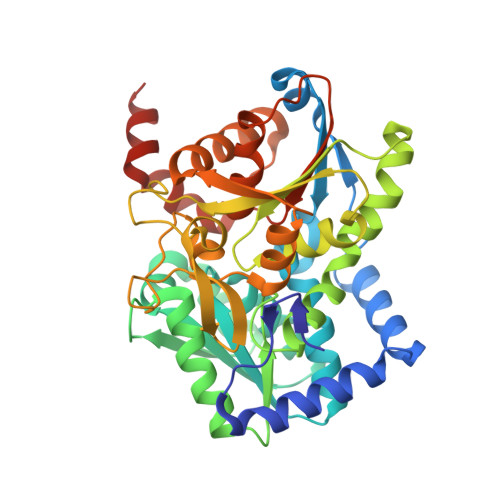A combinatorially complete epistatic fitness landscape in an enzyme active site.
Johnston, K.E., Almhjell, P.J., Watkins-Dulaney, E.J., Liu, G., Porter, N.J., Yang, J., Arnold, F.H.(2024) Proc Natl Acad Sci U S A 121: e2400439121-e2400439121
- PubMed: 39074291
- DOI: https://doi.org/10.1073/pnas.2400439121
- Primary Citation of Related Structures:
8VHH - PubMed Abstract:
Protein engineering often targets binding pockets or active sites which are enriched in epistasis-nonadditive interactions between amino acid substitutions-and where the combined effects of multiple single substitutions are difficult to predict. Few existing sequence-fitness datasets capture epistasis at large scale, especially for enzyme catalysis, limiting the development and assessment of model-guided enzyme engineering approaches. We present here a combinatorially complete, 160,000-variant fitness landscape across four residues in the active site of an enzyme. Assaying the native reaction of a thermostable β-subunit of tryptophan synthase (TrpB) in a nonnative environment yielded a landscape characterized by significant epistasis and many local optima. These effects prevent simulated directed evolution approaches from efficiently reaching the global optimum. There is nonetheless wide variability in the effectiveness of different directed evolution approaches, which together provide experimental benchmarks for computational and machine learning workflows. The most-fit TrpB variants contain a substitution that is nearly absent in natural TrpB sequences-a result that conservation-based predictions would not capture. Thus, although fitness prediction using evolutionary data can enrich in more-active variants, these approaches struggle to identify and differentiate among the most-active variants, even for this near-native function. Overall, this work presents a large-scale testing ground for model-guided enzyme engineering and suggests that efficient navigation of epistatic fitness landscapes can be improved by advances in both machine learning and physical modeling.
- Division of Biology and Bioengineering, California Institute of Technology, Pasadena, CA 91125.
Organizational Affiliation:



















